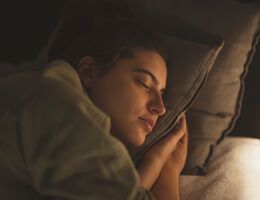Make the most of your naps

Aug. 12, 2024—There's something to be said for napping. For starters, an occasional snooze may be just the thing you need to power productively through the rest of a busy afternoon. Napping may even have wellness benefits that are nothing to yawn about.
But if you want to be intentional about napping, you'll want to make sure your efforts don't end up doing more harm than good. And you should know when napping may point to a hidden health issue.
The power of a nap
Napping may be good for you in more ways than one. For instance, the American Heart Association (AHA) and other experts report that napping may:
- Improve your alertness, which might help you focus.
- Lift your mood, if you find yourself feeling irritable as the day grinds on.
- Help you remember more of what you learned earlier in the day.
- Boost your creativity, since your brain uses sleep to work out ideas.
There's also evidence that, in the long run, napping may improve your physical health—for instance, by lowering your blood pressure, notes the Sleep Foundation.
The downside of napping
On the other hand, if you nap for too long, you could wake up groggy instead of alert.
A long nap could also prevent you from falling asleep at night and getting at least seven hours of shut-eye. And, over time, that sleep deficit could harm your health.
It's also important to know why you're napping. If you often find yourself feeling tired during the day, that could be a red flag for your health. Excessive daytime sleepiness can be a symptom of a health condition, such as sleep apnea (when breathing briefly stops during sleep).
To gauge your sleep, take our self-assessment and talk with your doctor about the results.
Make the most of naptime
Here are some suggestions to consider when planning a nap:
Nap in the afternoon. For most people, around 3 p.m. is the best time, says the AHA.
Keep your nap short. Aim for less than 30 minutes. Sleeping longer likely means disrupting a deep-sleep stage of your natural sleep cycle.
Find a nice place to nap. The perfect place would be a quiet, dark room that's a little on the cool side, temperature-wise. If that's not an option, choose a safe spot, and consider using earplugs or an eye mask to block out any disruptions.
Have your coffee before you nap. If you're planning to have a caffeinated beverage regardless of your nap, drink it beforehand. The effects should kick in as you're waking up.
Sources
- American Heart Association. "Enjoy Your Nap, But Be Aware of the Pros and Cons." https://www.heart.org/en/news/2020/07/22/enjoy-your-nap-but-be-aware-of-the-pros-and-cons.
- American Heart Association. "Take a Nap: The Benefits of Napping and How to Make It Work for You." https://www.heart.org/en/healthy-living/healthy-lifestyle/sleep/benefits-of-napping.
- Sleep Foundation. "About 80% of Us Nap, But Are We Doing It Right?" https://www.sleepfoundation.org/sleep-news/who-is-napping-and-how-long-are-naps.
- Sleep Foundation. "What Is a NASA Nap: How to Power Nap Like an Astronaut." https://www.sleepfoundation.org/sleep-hygiene/nasa-nap.
